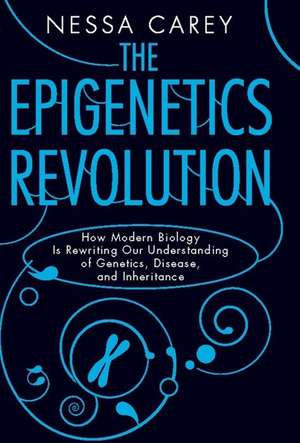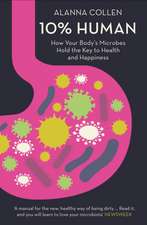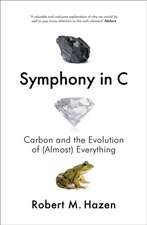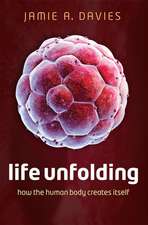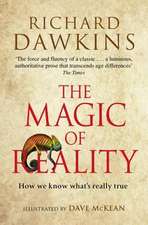The Epigenetics Revolution: How Modern Biology Is Rewriting Our Understanding of Genetics, Disease, and Inheritance
Autor Nessa Careyen Limba Engleză Paperback – 30 sep 2013 – vârsta de la 22 ani
The new scientific field, epigenetics, is revolutionizing our understanding of the structure and behavior of biological life on Earth. Epigenetic ideas help explain why mapping an organism's genetic code is simply not enough to determine how it develops or acts, and shows how nurture combines with nature to engineer biological diversity. Surveying some of the key scientific investigations and breakthroughs in this field over the past twenty years, Nessa Carey paints a broad intellectual canvas that readers of science and medicine will find both fascinating and promising. Her book helps us discover how we are much more than the sum of our genetic codes.
| Toate formatele și edițiile | Preț | Express |
|---|---|---|
| Paperback (2) | 76.24 lei 3-5 săpt. | +10.94 lei 7-11 zile |
| Icon Books Ltd – 29 feb 2012 | 76.24 lei 3-5 săpt. | +10.94 lei 7-11 zile |
| Columbia University Press – 30 sep 2013 | 105.00 lei 6-8 săpt. | |
| Hardback (1) | 146.94 lei 6-8 săpt. | |
| Columbia University Press – 29 feb 2012 | 146.94 lei 6-8 săpt. |
Preț: 105.00 lei
Preț vechi: 110.52 lei
-5% Nou
Puncte Express: 158
Preț estimativ în valută:
20.09€ • 20.76$ • 16.72£
20.09€ • 20.76$ • 16.72£
Carte tipărită la comandă
Livrare economică 25 martie-08 aprilie
Preluare comenzi: 021 569.72.76
Specificații
ISBN-13: 9780231161176
ISBN-10: 0231161174
Pagini: 352
Dimensiuni: 155 x 229 x 18 mm
Greutate: 0.45 kg
Editura: Columbia University Press
ISBN-10: 0231161174
Pagini: 352
Dimensiuni: 155 x 229 x 18 mm
Greutate: 0.45 kg
Editura: Columbia University Press
Notă biografică
Recenzii
Anyone seriously interested in who we are and how we function should read this book. -- Peter Forbes The Guardian Nessa Carey takes us on a lively and up-to-date tour of what's known about epigenetic mechanisms and their implications for ageing and cancer. -- Laurence Hurst, University of Bath Focus Magazine [Nessa Carey's] book combines an easy style with a textbook's thoroughness... A bold attempt to bring epigenetics to a wide audience. -- Jonathan Weitzman Nature Carey's report on the rapidly developing state of epigenetics research may help nonscientists with public-policy, investment, and health-care decisions. Booklist 1/30/12 An exhilarating exploration of an exciting new field, and a good gift for a bright biologystudent looking for a career choice. Kirkus Reviews 3/1/12 An enlightening introduction to what scientists have learned in the past decade about [epigenetics]. -- Carl Zimmer The Wall Street Journal 3/10/12 This book provides an excellent introduction to a fascinating new field that may revolutionize our understanding of human health and disease. Highly recommended. Library Journal 3/15/12 A must-read for every intelligent person who likes to know what is going on in modern science. -- Graham Storrs New York Journal of Books 3/6/12 she provides an excellent and largely accurate account of a fascinating and fast-moving area of modern biology. -- Jonathan Hodgkin Times Literary Supplement 5/4/2012 Written in an engaging manner using everyday metaphors to clarify complex concepts and utilizing well--defined diagrams, the author has produced an outstanding book with her wit and expertise. -- Rita Hoots NSTA Recommends (National Science Teachers Association) 5/30/2013
Descriere
Descriere de la o altă ediție sau format:
'A book that would have had Darwin swooning - anyone seriously interested in who we are and how we function should read this.' Guardian
At the beginning of this century enormous progress had been made in genetics. The Human Genome Project finished sequencing human DNA. It seemed it was only a matter of time until we had all the answers to the secrets of life on this planet.
The cutting-edge of biology, however, is telling us that we still don't even know all of the questions.
How is it that, despite each cell in your body carrying exactly the same DNA, you don't have teeth growing out of your eyeballs or toenails on your liver? How is it that identical twins share exactly the same DNA and yet can exhibit dramatic differences in the way that they live and grow?
It turns out that cells read the genetic code in DNA more like a script to be interpreted than a mould that replicates the same result each time. This is epigenetics and it's the fastest-moving field in biology today.
The Epigenetics Revolution traces the thrilling path this discipline has taken over the last twenty years. Biologist Nessa Carey deftly explains such diverse phenomena as how queen bees and ants control their colonies, why tortoiseshell cats are always female, why some plants need a period of cold before they can flower, why we age, develop disease and become addicted to drugs, and much more. Most excitingly, Carey reveals the amazing possibilities for humankind that epigenetics offers for us all - and in the surprisingly near future.
The cutting-edge of biology, however, is telling us that we still don't even know all of the questions.
How is it that, despite each cell in your body carrying exactly the same DNA, you don't have teeth growing out of your eyeballs or toenails on your liver? How is it that identical twins share exactly the same DNA and yet can exhibit dramatic differences in the way that they live and grow?
It turns out that cells read the genetic code in DNA more like a script to be interpreted than a mould that replicates the same result each time. This is epigenetics and it's the fastest-moving field in biology today.
The Epigenetics Revolution traces the thrilling path this discipline has taken over the last twenty years. Biologist Nessa Carey deftly explains such diverse phenomena as how queen bees and ants control their colonies, why tortoiseshell cats are always female, why some plants need a period of cold before they can flower, why we age, develop disease and become addicted to drugs, and much more. Most excitingly, Carey reveals the amazing possibilities for humankind that epigenetics offers for us all - and in the surprisingly near future.
